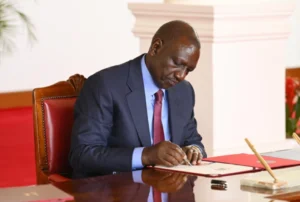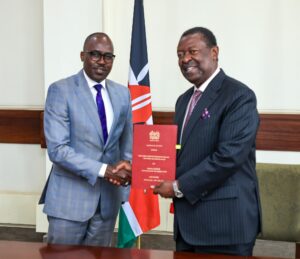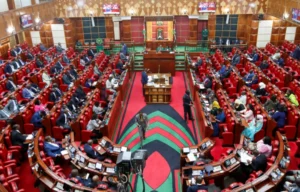Water Leakages Cost Kenya Billions Annually
Mugaa called for collective action. He requested that all 47 counties, water utility firms, and the government join forces. He reminded the leaders

The CS explained that the wastage comes from leaking pipes, poor infrastructure maintenance, illegal water connections, and inefficiencies in service delivery. PHOTO/@mugaa_eric/X
By Juliet Jerotich
Kenya is losing over Ksh12 billion every year through wastage of water. Water Cabinet Secretary Eric Mugaa explains that the wastage is pulling funds that could be impacting heavily on millions of individuals.
Mugaa spoke to the Kenyatta International Convention Centre in Nairobi on Wednesday, August 29, 2025. He was launching the Athi Water Works Strategic Plan. The CS appealed to ministry officials and county governments to come up with concrete solutions to avert the losses.
He reminded shareholders that the ministry is accountable for providing water infrastructure, policy making, and sector leadership. He, however, acknowledged that the government is facing critical challenges from huge losses. According to him, the country loses nearly 44 percent of its water supply every year.
“We are losing water worth more than Ksh12 billion annually. Is that sustainable? If not, what are we doing to stop it?” Mugaa asked.
The CS went on to explain that the wastage is because of leaking pipes, inefficiencies in infrastructure maintenance, illegal water connections, and inefficiencies in service provision. He further explained that this cannot continue while the majority of Kenyans remain without clean water.
Mugaa called for collective action. He requested that all 47 counties, water utility firms, and the government join forces. He reminded the leaders that water is owned by all. Mismanagement, he insisted, affects millions of families who already have shortages.
The CS further stressed the need for new technology and effective planning. He suggested measures like smart meters, high-tech leak detection systems, and stricter penalties for theft of water. According to him, these measures are capable of securing the industry and reducing losses.
The government is facing increased pressure to fix inefficiency within all public institutions. Individuals are demanding accountability regarding how resources are being managed. Mugaa vowed that Kenyans would see improvements in the water industry. He emphasized that no country is able to develop sustainably while losing practically half its water supply.
His restraint is the latest in a succession of rising concerns with management at key ministries. In heightened public attention, Mugaa insists that saving water and protecting resources must receive national priority.





